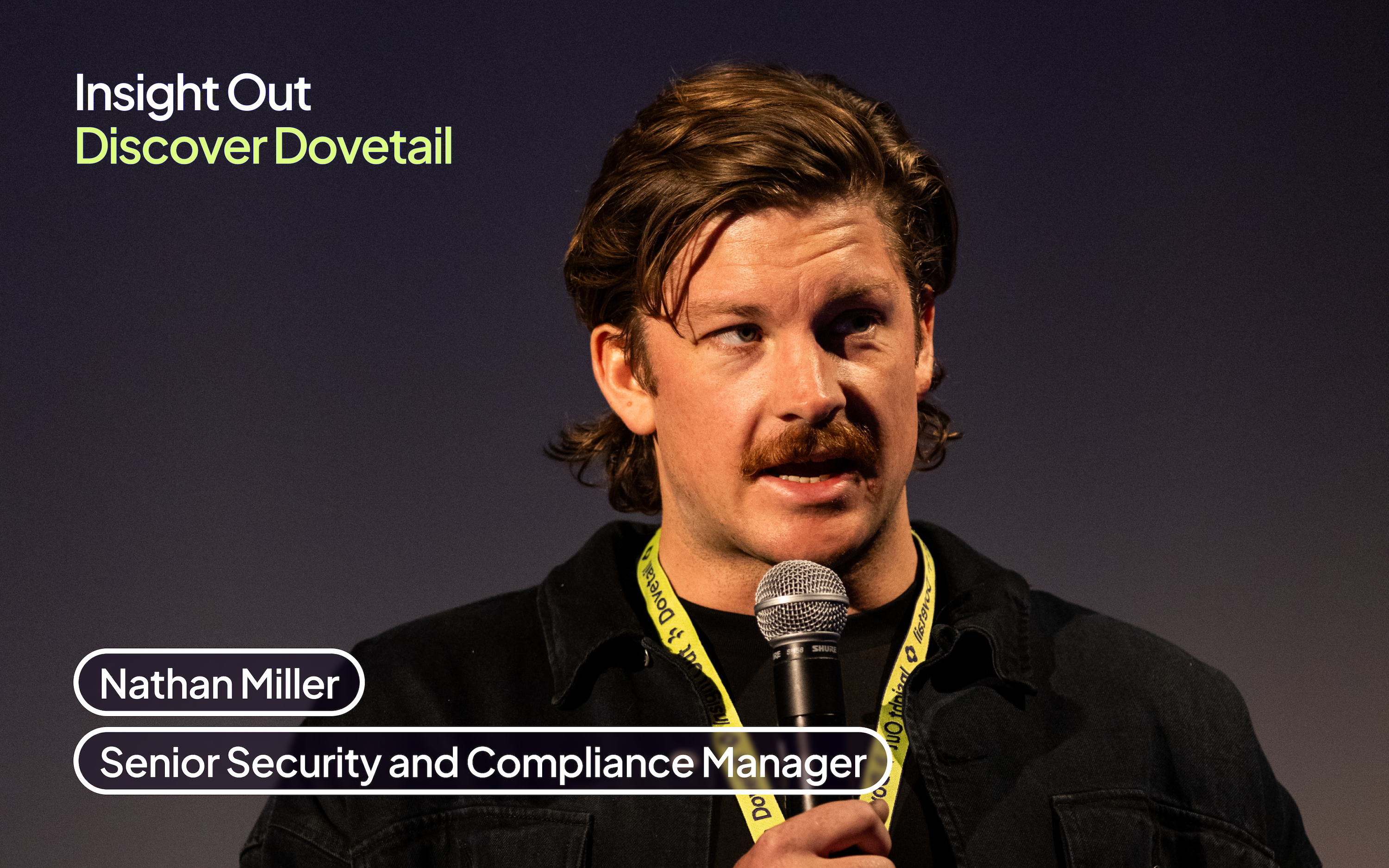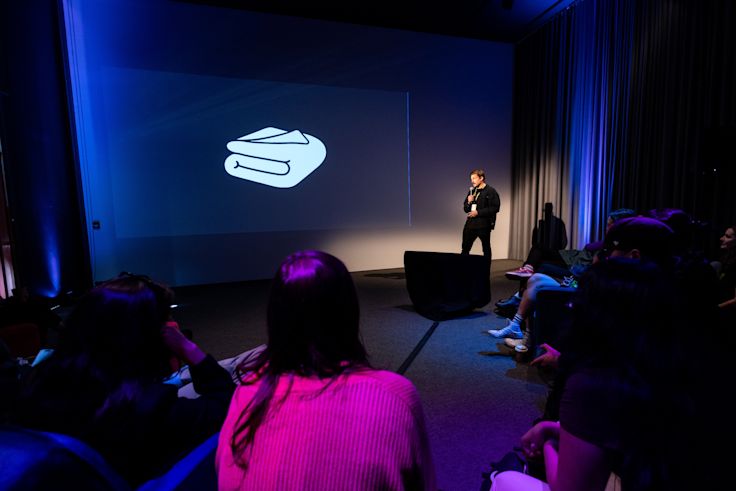Years to build, moments to break

In this spark talk, our Senior Security and Compliance Manager, Nathan Miller, discusses how security measures are essential in building and maintaining customer trust, especially for enterprise solutions.
My name’s Nathan. I’m Senior Manager, Security and Compliance here at Dovetail.
One of my favorite parts of my job is talking to prospective customers about their security requirements. Although, I actually speak to their security teams, which gets me thinking—it’s not your security teams that are using Dovetail. It’s you!
So, I want to use this opportunity to highlight some of Dovetail’s security features. I’ll also share why I think they’re important and why I think you should use them.
The significance of trust
Before I get into that, I want to start with a story that shows the significance of trust.
Close your eyes and think of an object that means a lot and is significant to you. Mine is a blanket that my grandma gave me. Her grandma knitted it, so it’s been passed down through the generations. It means a lot to me but doesn’t mean much to anyone else.
Now, I want you to think of someone that’s important in your life—someone you trust. This could be a sibling, a significant other, a parent, or a close friend. You’ve spent years building up trust with this person.
Let’s just say that for whatever reason, you need to give them your treasured item to look after. They tell you that they know how much this means to you and that they will look after it like it’s their own. You trust they will look after it. You trust they won’t sell it or lose it. You trust they will protect it.
However, things don’t always go according to plan. Let’s just say they lost your treasured item. They lost it after they said they would look after it and despite the trust you placed in them. How would this make you feel? If my close friend lost my grandma’s blanket, I’d feel pretty upset.

What’s happened here is that trust has been broken—trust that has taken years to build has been broken in a matter of moments.
But why am I telling you this?
Well, I think this is a great analogy for how data and the companies we entrust with our data work. Dovetail is one of these companies, and you probably work for one as well. We spend years investing huge amounts of time, energy, and money into building trust within our brand, which means our customers are confident and trust us with their data.
There’s a good chance that everyone in this room has been a victim of a data breach or cyber attack. Here’s a personal recent example: one of Australia’s largest telecommunications companies had a data breach last year. I had been a loyal customer for many, many years, and their brand had a really good reputation. As a result of the data breach, names, addresses, and IDs were stolen.
I ended up leaving, and so did so many other Australians. The trust I had in the company had been broken. The trust they spent years building had been broken in a matter of moments.
Hopefully, this highlights the value of that trust relationship you have with your customers and why one event or mistake can have a significant impact on that relationship.
Harnessing the power of Dovetail to put your customers first and nurture trust
At Dovetail, we have a few different values. “Put the customer first” is my favorite.
I could spend hours chatting about what we do at Dovetail to keep your data secure. But I want to focus on what you can do as a Dovetail user—how you can use some of our features to protect your customers’ data and put them first.
Let’s just say you work for a healthcare provider. Your project is to interview patients who have recently stayed at one of your hospitals. As part of this, a patient might disclose some sensitive health data to you. You really want to use Dovetail for this project, but at the same time, you want to protect that customer and the data they have trusted you with.

Single sign-on
So, how will you share your insights with your colleagues in the hospital? How do you manage this at a large organization? How do you ensure that only people who need access to Dovetail get access? What happens when they leave? How do we revoke that access? How do we ensure they’re not using silly passwords like “password 123”?
Well, it’s easy. We have single sign-on, which is easy to set up. You can ensure that when new people join your organization and need access to Dovetail, they can get access straight away. When they leave, their access is revoked.
You can also use things like multi-factor authentication. So, if their password is compromised, you’ve got that extra layer of safety.
Your security teams can also set up password policies so that “password 123” isn’t a thing.
Magic redact
Let’s go back to that example where a patient shares sensitive data with you.
That information might not be relevant to your research project at all. How can we safely remove these details to protect your customer’s data? Well, we now have magic redact.
This feature allows you to highlight specific parts of a transcript so you can remove that bit of data from that note and our database. It can also blur or silence the video during the part where the sensitive information is being shared. You can also choose to blur the whole video if you wish.
All this helps protect your customers so that if you share that note with the wrong person, you’ve already done the hard work to remove that sensitive data, minimizing the impact.
Group management
Back to our project. So it probably contains some sensitive data at this point that our patient has disclosed. Perhaps you don’t want to go through and redact all that data. Maybe the data is actually necessary for the project.
In that case, how do we ensure that only certain people—those who need access—have access to that project? It’s easy—we’ve got groups. You can set up groups in a way where you can, by default, not allow access to everyone in the workspace—only the group that’s approved to access the data.

Custom data retention
Now, let’s say we’ve completed our research project. We’ve created the insights and we’re wrapping up. What value does keeping the video in Dovetail provide? None! We’ve gotten what we needed from it. So why not just delete it?
Well, we can do that with custom data retention, which is an Enterprise feature. You can set a time period on a project or workspace level. After that time, the video will be deleted.
This feature allows you to manage your data retention at scale and automatically. More importantly, it’s protecting your customer’s data.
The four features I’ve shown you today—single sign-on, magic redaction, group management, and custom data retention—are just some simple features you can start using now to help protect your data and the trust your customers have in your brand.
Editor’s note: This article is a condensed overview of Nathan Miller’s spark talk at Insight Out 2024.
Related Articles


